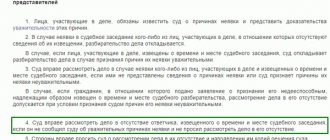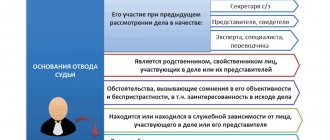In this article I will talk about the concept of legal costs in the arbitration process, about their types: state fees and court costs, about the procedure for compensation (collection) of such by the court. Goals, objectives, subject of regulation, calculation procedure and procedural rights of the parties - both theoretical and practical aspects of working with this legal institution will be touched upon. Pricing issues both in our company and in others are disclosed in a separate material “Cost of representation in arbitration court”.
Legal costs in arbitration proceedings
The institution of legal costs in the arbitration process has two main directions. Firstly, reimbursement of state budget expenses for the maintenance of the arbitration judicial system for the consideration of disputes within the jurisdiction of the court. Salaries of judges, logistics of the courts, payment of remuneration for participation in the case to translators, witnesses, experts and other expenses borne by the arbitration court are compensated by the parties to the dispute. Secondly, the institution of legal expenses is intended to carry out a preventive function and limit the arbitration court from unfair handling of claims and statements when the party does not have real and/or formal grounds for filing claims. This function is implemented by collecting legal costs from the losing party in the dispute: the defendant who is evading the fulfillment of his obligation or the plaintiff who has unreasonably made a claim. Also, the Arbitration Procedural Code contains provisions that allow the court to recover legal costs from a party that abuses its right: delaying the process, not appearing or failing to provide documents at the request of the court - regardless of the outcome of the case. This is the theoretical basis of legal costs in arbitration proceedings. Legal costs can be of two types:
state duty (state duty)
legal costs
State fee to the arbitration court
The state duty is a mandatory monetary collection (tax) established by the Tax Code of the Russian Federation from a person applying to the arbitration court for protection of his interests in the amount established by Art. 333.21 Tax Code of the Russian Federation. The state fee is paid when submitting an application to arbitration and is distributed when a judicial act is issued on the merits of the dispute. The amount of state duty paid varies significantly depending on the size and subject of the claim. For example, at the moment, when collecting a sum of money in an arbitration court, the state duty is calculated as follows:
- from 100,001 rubles to 200,000 rubles – 4,000 rubles + 3% of the amount, over 100,000 rubles;
- from 200,001 rubles to 1,000,000 rubles – 7,000 rubles + 2% of the amount, over 200,000 rubles;
- from 1,000,001 rubles to 2,000,000 rubles – 23,000 rubles + 1% of the amount, over 1,000,000 rubles;
- from 2,000,000 rubles – 33,000 rubles + 0.5% of the amount, over 2,000,000 rubles, but not more than 200,000 rubles.
Also, the amount of the state duty is calculated separately in case of non-property disputes (on the recognition of rights, on the recognition of transactions as invalid, on the establishment of legal facts, on challenging decisions and actions of state bodies, etc.), when filing an application to declare the debtor insolvent (bankrupt), when filing a petition to secure a claim, when filing an appeal, cassation or supervisory complaint against judicial acts in other cases provided for by law.
Legal costs
Legal costs in the arbitration process are recognized as all expenses incurred by the parties, in addition to the payment of state fees, when they are directly related to the proceedings in a specific case. Legal costs are:
- expenses for the services of a representative, lawyer, or other person providing representation in court
- amounts to be paid to experts (when conducting forensic examinations or engaging an expert to testify in a case), translators (with the participation in the case of persons who do not speak or have little knowledge of the Russian language), witnesses
- costs associated with on-site inspection of claimed evidence (extremely rare)
- other expenses incurred by the participants in the process, incl. business trips, passes, etc.
Concept of legal expenses
In accordance with Article 101 of the Arbitration Procedure Code, court costs consist of state fees and legal costs associated with the consideration of the case in the arbitration court.
In turn, legal costs (Article 106 of the APC) are:
- expenses for the services of lawyers and other representatives,
- sums of money to be paid to experts, specialists, witnesses, translators,
- costs associated with on-site inspection of evidence,
- all other expenses incurred by the persons participating in the case in connection with the consideration of the case in the arbitration court (for example, costs of travel to the city where the court is located, payment for a hotel, etc.).
Amount of costs
As part of the process, you have to pay for the services of representatives, the preparation of examinations, etc. However, if you win, not everything will be compensated.
In order for the company to replenish these amounts, it will have to prove the reasonableness of the payments and the fact that the money was transferred. In addition, the court must accept that the costs are costs.
What are legal costs is stated in Article 106 of the Arbitration Procedure Code of the Russian Federation. In accordance with this, the courts recognize the following costs as costs:
- For specialists: experts, translators, other specialists. This also includes payments to witnesses.
- For the inspection required to identify evidence on site.
- For representatives, including not only payment for services, but also expenses for accommodation, travel, etc. At the same time, the courts do not consider “success fees” as costs.
- For notification of a corporate dispute, if the participant in the dispute is obliged to notify about it by force of law.
- To receive extracts from the Unified State Register of Legal Entities and Unified State Register of Individual Entrepreneurs.
- To collect evidence.
- To comply with the pre-trial procedure for resolving a dispute, if required by law or the terms of the contract.
- To consider an application for compensation of legal costs and expenses.
- By virtue of an agreement between the parties to the dispute on the distribution of legal costs.
- At the stage of execution of the court decision. For example, the debtor asked for a postponement or installment plan, and the participation of the claimant in the meetings entailed expenses. The debtor will have to compensate them.
- For other purposes, if required during the process.
This is also important to know:
Who are the participants in the bankruptcy case?
It is important to consider which costs are not considered expenses. However, in some cases, third parties have the right to demand reimbursement of their expenses.
Distribution, compensation, collection of legal expenses
As a general rule, all legal expenses incurred by a party: both state fees and court costs paid - are recovered from the losing party. It should immediately be noted that the paid state duty is collected by the court, regardless of whether the plaintiff declared it or not due to the fact that the court initially knows about the fact of its payment by the plaintiff and its amount (otherwise the case would not have been accepted by the judge for proceedings ). If you want to compensate for legal costs, the party must declare this and confirm its arguments with all the necessary documents: an agreement for the provision of legal services, payment orders for the payment of money for representation services (it is possible to confirm legal costs and a receipt), if possible, acts on services rendered , travel documents, travel certificates, receipts, checks for travel, food, accommodation, etc. At the same time, the court in all cases verifies the reasonableness and expediency of the entertainment expenses incurred. That is, initially, the possibility of the winning party abusing its right to collect legal costs from the losing party is excluded. The court examines the declared size and composition of monetary amounts for their excessiveness and reasonableness and, in most cases, the amounts paid for judicial arbitration representation are underestimated by judges. At the same time, the party that declared them has the right to present evidence of the reasonableness of these figures, and the compensating party has the right to refute it. There are many more circumstances for the distribution of legal costs between the parties, incl. The parties have the right to independently conclude an appropriate agreement. In the article, I indicated the basic principles for determining legal costs in the arbitration process, and on specific issues - Welcome to the comment form below!
Reimbursement of expenses for the services of a representative in civil and arbitration proceedings
This problem does not lose its relevance even today, despite the fact that the Constitutional Court of the Russian Federation (hereinafter referred to as the Constitutional Court of the Russian Federation) expressed its position on the issue of reimbursement of expenses for a representative in the Determination of December 21, 2004 N 454-O, in which it was disputed constitutionality of Part 2 of Art. 110 Arbitration Procedure Code of the Russian Federation. The Constitutional Court of the Russian Federation refused to accept the complaint for consideration, but indicated that the right of the arbitration court to reduce the amount collected for reimbursement of relevant expenses, if it is excessive, is a guarantee of “the balance of procedural rights and obligations of the parties” [5].
The outcome of the case depends on the professionalism of the representative, therefore the parties to the process prefer to seek legal assistance from companies with an impeccable business reputation and a high rating, despite the fact that, in accordance with the Civil Procedure Code of the Russian Federation and the Arbitration Procedure Code of the Russian Federation, persons without a legal background have the right to act as representatives of citizens [ 6]. Based on the amount of fees of leading law firms, published by the electronic periodical Legal.Report [7], we can conclude that the costs of representative services amount to a fairly large amount, often exceeding the amount of claims. For example, in a legal dispute between the shareholder of OJSC Novolipetsk Metallurgical Plant (NLMK), Vladimir Lisin, and the founder of OJSC Maxi-Group, Nikolai Maximov, the recovered legal costs for the representative’s servants amounted to 5.37 million rubles [8] . While the parties are interested in recovering legal costs for a representative from the procedural opponent in full, in judicial practice, on the contrary, there is a tendency to reduce the amount of costs for a representative collected by the court from the losing party.
In this regard, it is necessary to find out, firstly, what criteria are used by the courts when determining “reasonable limits”, secondly, who bears the burden of proving the “reasonableness” of the expenses incurred and, thirdly, whether the so-called “success fee” is legal. , i.e. “payment for a specific court decision, regardless of the amount of work that the contractor must perform under the contract”[9]?
So, what are the courts of general jurisdiction and arbitration courts guided by when determining the “reasonableness” of the costs of paying for the services of a representative? In the Resolution of the Plenum of the Supreme Court (hereinafter referred to as the Supreme Court of the Russian Federation) dated January 21, 2021 No. 1[10], reasonable expenses for paying for the services of a representative are understood to be those expenses that “under comparable circumstances are usually charged for similar services” [11]. From the meaning of this wording it follows that the court must take into account the location of the dispute - the cost of legal services varies greatly depending on the region. In particular, in generalizing the practice of consideration by the courts of the region of cases and issues regarding legal costs, the Vladimir Regional Court about, and not the prices for the provision of legal assistance by representatives in the Moscow region, which the courts of first instance mistakenly relied on when making a decision.
The resolution also contains criteria such as “the volume of the stated requirements, the price of the claim, the complexity of the case, the volume of services provided by the representative, the time required for him to prepare procedural documents, the duration of the consideration of the case” [12]; This list is not exhaustive. The Information Letter of the Supreme Arbitration Court of the Russian Federation dated August 13, 2004 No. 82 “On some issues of application of the Arbitration Procedural Code of the Russian Federation” states that the court may take into account the following circumstances: “standards of expenses for business trips established by legal acts, the cost of economical transport services, time what a qualified specialist could spend on preparing materials, the complexity of the case and the duration of its consideration” [13].
For example, in case No. A40-113449/14, the arbitration court, recognizing that the case “cannot be called particularly complex, ... and, therefore, the participation of five specialists is reasonable”[14], made a decision to recover 360,203 rubles out of the declared 1.8 million rubles for representatives’ expenses. But in case No. A40-19444/15 [15], the court of cassation made a decision to recover the amount for the expenses of representatives almost in full (1.2 million rubles out of 1.6 million rubles), taking into account the business reputation of the company, increased legal and factual complexity of the case, as well as the provision of legal assistance in courts of three instances. It is noteworthy that in civil proceedings, the fame of a representative is not a basis for recognizing expenses as reasonable [16], while in arbitration proceedings, the position of a law firm (and individual lawyers) in ratings (for example, THE LEGAL 500, Chambers, Best lawyers) represents an important criterion for determining the “reasonableness” of expenses.
Another important point. The Presidium of the Supreme Arbitration Court of the Russian Federation in the Resolution of July 24, 2012 on [17], i.e. incurring expenses for the protection of a property interest in an amount equal to the interest or even greater cannot indicate unreasonableness. Thus, the amount of the property interest is not a criterion.
Now let’s find out who bears the burden of proving the “reasonableness” of the expenses incurred. In accordance with Part 1 of Art. 56 Code of Civil Procedure of the Russian Federation and Part 1 of Art. 65 of the Arbitration Procedure Code of the Russian Federation, the parties to the process must prove the circumstances to which they refer as the basis for their claims. Consequently, the person who demands reimbursement of expenses for the services of a representative proves their amount and the fact of payment, and the other party has the right to declare their excessiveness.
Shell Oil LLC filed a complaint with the Constitutional Court of the Russian Federation about the violation of constitutional rights and freedoms by the provisions of Part 2 of Art. 110 of the Arbitration Procedure Code of the Russian Federation after the arbitration court satisfied the recovery of only 300 thousand rubles out of the declared 2.75 million rubles in legal costs. In the decision refusing to accept this complaint for consideration, the Constitutional Court of the Russian Federation indicated that the court may, due to “the specific circumstances of the case,” for example, if a party to the process abuses the right, independently raise the question of the reasonableness of the costs incurred, thereby ensuring “the necessary balance of procedural rights and responsibilities" [18]. However, including according to the Resolution of the Plenum of the Supreme Court of the Russian Federation No. 1, which I have repeatedly cited, the court does not have the right to reduce the amount of expenses arbitrarily if the other party does not declare them to be excessive and does not provide relevant evidence to substantiate its claim. “Reasonableness” of expenses as a category is designed to combat the unreasonable inflation of the cost of representatives’ services and is not unconstitutional.
Finally, let's look at existing positions regarding success fees. In 2007, the Constitutional Court of the Russian Federation, in Resolution No. 1-P of January 23, 2007, actually banned the success fee, indicating that “the contractual determination of the rights and obligations of the parties within the framework of civil relations for the provision of legal assistance” must be carried out in compliance with the proper balance between such constitutionally protected values as guaranteeing qualified and accessible legal assistance; the activities of state bodies (we are talking about acts of courts, on which payment for the services of a representative is dependent) “cannot be the subject of private law regulation” [19].
In the Resolution of the Presidium of the Supreme Arbitration Court of the Russian Federation dated February 4, 2014 No. 16291/10, the Supreme Arbitration Court of the Russian Federation explained that regardless of how the remuneration condition is formulated in the contract, the court can collect it, but again within “reasonable limits”, assessing the efforts of the representative , which played a decisive role in shaping the court’s position. But in a later case, NLMK versus OJSC Maxi-Group, the judicial panel for economic disputes of the Supreme Court of the Russian Federation refused to recover the 3 million “success fee” as legal expenses, justifying this by the fact that, firstly, the payment of the specified amount “ was made dependent solely on the positive outcome of the consideration of the case” [20], and, secondly, the procedural opponent was not a party to the agreement “reached by the parties to the contract for the provision of legal services.”
Currently, attitudes towards success fees are changing in a positive direction. Thus, Judge of the Supreme Court of the Russian Federation V.V. Momotov, speaking at the IV Moscow Legal Forum at the Moscow State Law Academy named after. O. E. Kutafina in April 2017, about [21]. Thus, the practice of courts on this issue is not uniform and may change radically in the near future.
These are, in general terms, the provisions of the law and the conclusions of judicial practice that need to be taken into account when deciding the issue of “reasonable limits” for the costs of paying for the services of a representative.
[1] Civil Procedure Code of the Russian Federation dated November 14, 2002 N 138-FZ (as amended on December 19, 2016) (with amendments and additions, entered into force on January 1, 2017) // Russian newspaper. 2002. 20.11. N 220.
[2] Ibid. Art. 100.
[3] Arbitration Procedural Code of the Russian Federation (Part 2, Article 110) dated July 24, 2002 N 95-FZ // Rossiyskaya Gazeta. 2002. July 27. N 137.
[4] Information letter of the Presidium of the Supreme Arbitration Court of the Russian Federation dated December 5, 2007 N 121 “Review of judicial practice on issues related to the distribution between the parties of legal costs for the services of lawyers and other persons acting as representatives in arbitration courts” // SPS Consultant Plus. P. 3.
[5] Determination of the Constitutional Court of the Russian Federation of December 21, 2004 N 454-O “On the refusal to accept for consideration the complaint of the limited liability company “Trust”” for violation of constitutional rights and freedoms by part 2 of Article 110 of the Arbitration Procedural Code of the Russian Federation" / / SPS Consultant Plus.
[6] Arbitration Procedure Code of the Russian Federation, art. 59, Code of Civil Procedure of the Russian Federation, Art. 49; Information letter of the Presidium of the Supreme Arbitration Court of the Russian Federation dated 08/13/2004 N 82 (as amended on 07/01/2014) “On some issues of application of the Arbitration Procedural Code of the Russian Federation” // Bulletin of the Supreme Arbitration Court of the Russian Federation. 2004. N 10. P. 10.
[7] El. periodical Legal report, URL: https://legal.report/article/24102016/legal.report-vpervye-raskryvaet-razmer-gonorarov-krupnyh-yuridicheskih-kompanij-rossii (accessed May 29, 2017).
[8] Bank of decisions of arbitration courts, URL: https://kad.arbitr.ru/Kad/Card?number=%D0%9060-11353%2F2013 (date of access - 05/29/2017). Internet publication Pravo.ru, URL: https://pda.pravo.ru/court_report/view/115970/ (access date: 05/29/2017).
[9] Resolution of the Constitutional Court of the Russian Federation dated January 23, 2007 N 1-P “In the case of verifying the constitutionality of the provisions of paragraph 1 of Article 779 and paragraph 1 of Article 781 of the Civil Code of the Russian Federation in connection with complaints from the limited liability company “Corporate Security Agency” and a citizen V.V. Makeev" // Rossiyskaya Gazeta. 2007. February 2. N 22.
[10] Resolution of the Plenum of the Supreme Court of the Russian Federation dated January 21, 2016 N 1 “On some issues of application of legislation on reimbursement of costs associated with the consideration of the case” // Rossiyskaya Gazeta. 2016. 01.03. N 43.
[11] Resolution of the Plenum of the Supreme Court of the Russian Federation dated January 21, 2016 N 1 “On some issues of application of legislation on reimbursement of costs associated with the consideration of a case” // SPS Consultant Plus. P.13.
[12] Ibid. P. 13.
[13] Information letter dated August 13, 2004 No. 82 “On some issues of application of the Arbitration Procedural Code of the Russian Federation” // Bulletin of the Supreme Arbitration Court of the Russian Federation. 2004. N 10. P. 20.
[14] Bank of decisions of arbitration courts, URL: https://kad.arbitr.ru/PdfDocument/14d8b346-c850-4b4e-8394-fc83ec8f713b/A40-113449-2014_20160425_Postanovlenie%20apelljacionnoj%20instancii.pdf (date of access – 29. 05.2017 ).
[15] Bank of arbitration court decisions, URL: https://kad.arbitr.ru/Card/f05a2005-90fa-47d7-afee-e7b5190923c6 (access date: 05/29/2017).
[16] Resolution of the Plenum of the Supreme Court of the Russian Federation dated January 21, 2016 N 1 “On some issues of application of the legislation on compensation of costs associated with the consideration of the case” // Rossiyskaya Gazeta. 2016. March 1. N 43. Item 13.
[17] Resolution of the Presidium of the Supreme Arbitration Court of the Russian Federation dated July 24, 2012 N 2598/12 in case No. A40-45684/11-99-202 // Bulletin of the Supreme Arbitration Court of the Russian Federation. 2012. N 11.
[18] Determination of the Constitutional Court of the Russian Federation dated March 29, 2016 N 677-O “On the refusal to accept for consideration the complaint of the limited liability company Shell Oil about the violation of constitutional rights and freedoms by the provisions of Part 2 of Article 110 of the Arbitration Procedure Code of the Russian Federation”// SPS Consultant Plus.
[19] Resolution of the Constitutional Court of the Russian Federation of January 23, 2007 N 1-P “In the case of verifying the constitutionality of the provisions of paragraph 1 of Article 779 and paragraph 1 of Article 781 of the Civil Code of the Russian Federation in connection with complaints from the limited liability company “Corporate Security Agency” and citizen V.V. Makeev” // Russian newspaper dated February 2, 2007 N 22.
[20] Ruling of the Supreme Court of the Russian Federation dated February 26, 2015 N 309-ES14-3167 in case N A60-11353/2013 // SPS Consultant Plus.
[21] Russian Information Agency TASS, URL: https://tass.ru/obschestvo/4159309 (accessed May 29, 2017).









